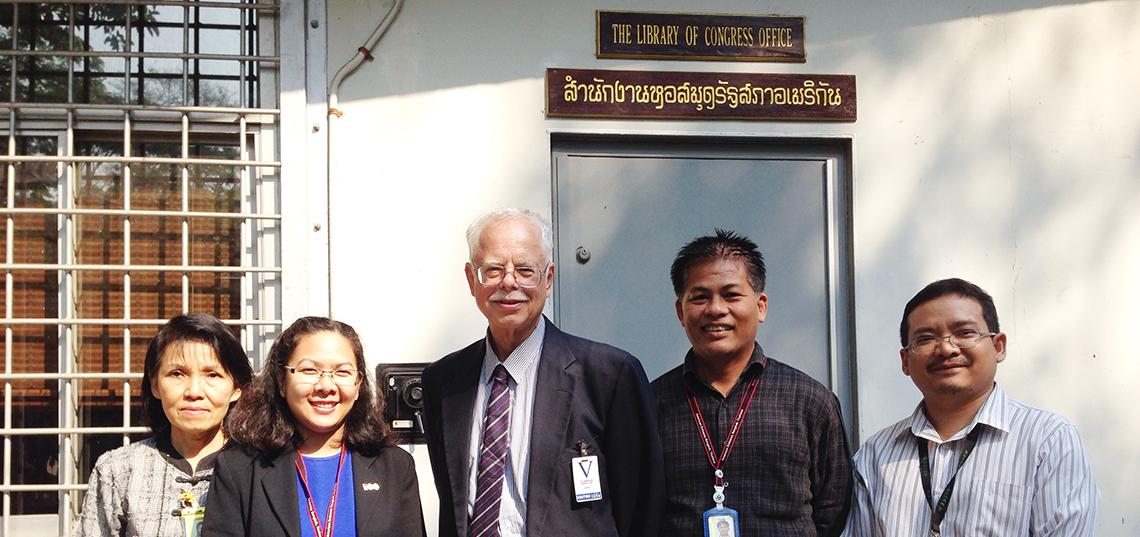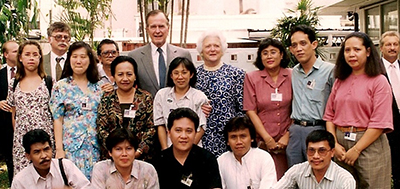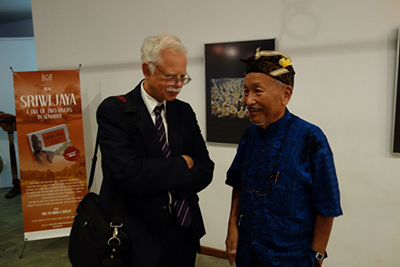
After having spent nearly four decades working for the Federal Government and in diplomatic service in Washington, D.C., the Middle East, and South and Southeast Asia, SC&I alumnus William Tuchrello ’74 leveraged his Master of Library Science (now the Master of Information) degree to achieve extraordinary professional success.
From 1994 – 2014, Tuchrello served as Field Director for the Library of Congress at the U.S. Embassy in Jakarta. He then served as Interim Executive Director of the AMINEF (Fulbright) in Indonesia. After returning to the United States, he chaired the Education Committee of the Civil Grand Jury in San Diego County, which oversaw the public academic and educational institutions in the city and county of San Diego, California.

For over three years he served as Executive Board Member and Vice President of the South Asian Arts Council at the San Diego Museum of Art. During that time, he also began to work as a pro-bono library consultant to the museum, a role he continues today. As a consultant, he helps prepare strategic and emergency action plans, develop cost effective ways to optimize the library, and implement strategies to expand service to the docents and curators.
Tuchrello is also currently a member of the Board of Directors of the San Diego World Affairs Council in San Diego.
Below, SC&I speaks with Tuchrello to discover more about his career, how his master’s degree has underpinned his success, his interests outside of work, and advice he has for current students and recent graduates who might want to follow in his footsteps in the Library of Congress.
Tell us about your Rutgers experience, and why you chose to earn a MLS at SC&I.
For several years prior to attending SC&I, I believed that access to information was going to play a major role in society, and, thus, libraries offered a venue to participate. I had selected a number of library graduate programs, but SC&I offered a focus on library administration and information management. In addition, Rutgers was close to New York City.
During your years at Rutgers, did you have a favorite instructor/professor? If so, who and how did that person affect your career path or studies at Rutgers?
I do recall that early in the public sector management course Ernie (former SC&I faculty member Ernest DeProspo) pointed out that people have a positive view towards libraries. However, to get things done a manager must align themselves with the services that are considered critical to the taxpayer, such as garbage collecting and public safety.
How do you apply the knowledge you gained at Rutgers in your dual roles as a Board Member for the San Diego World Affairs Council and Executive Board Member and Vice President of the South Asian Arts Council at The San Diego Museum of Art?
Libraries and museums are vital for a functioning democracy, but not primary concerns for the public as are public safety and city maintenance. Rutgers’s faculty provided me with the basic skills to be able to turn library and museum operational needs into requirements that budget and decision makers can understand in cost/benefit terms. As a newly elected Board member to the World Affairs Council, I learned from my Rutgers’ experience the value of listening to longer serving Board members before suggesting changes.
What are some of the recommendations are you making to The San Diego Museum of Art in the strategic plan you are preparing (pro bono), to help them prepare for an emergency, optimize the library, and expand service to the curators and docents?
The library lacked a comprehensive operation and procedure manual as well as a development plan. Hence, working with the librarian we developed a manual and a business plan to integrate the library into the museum’s master plan. One result of developing a business plan is the library has begun to reach out actively to the docents and museum councils instead of being reactive.
You spent over thirty years working at the Library of Congress, the last twenty-five as Field Director LOC in Asia and the Middle East in U.S. Embassies. What were some of the most rewarding and challenging aspects of your job?
Access to accurate timely information is vital in international diplomacy. However, policy makers today are often overwhelmed with technology, crisis management issues and distortions due to biased information. Because the policy of the Library of Congress is to provide access to information in a neutral fashion, I have had the opportunity to meet with high level political and social leaders in the U.S. and abroad and discuss issues relevant to carrying out diplomacy. One of the key ways is first discussing topics of interest, such as about family issues, to create a common ground for further communication; this is similar to a reference librarian’s skilled use of question negotiation. In addition, this work afforded my family and me the opportunity to experience other cultures and make life-long friends overseas.

What are some of the most important skills a librarian needs in order to succeed?
Critical thinking, understanding standards, and the ability to adapt to change are needed skills.
With new technologies in libraries constantly evolving, how can industry professionals stay on top of the latest trends and be prepared for what’s next?
Staying on top means continuing to develop critical thinking skills and listening to persons coming into the field with new ideas and methods of problem solving.
What do you enjoy the most about working?
I enjoy having the opportunity to continue to learn.
What is something people might not know about you?
I have changed my sports from primarily swimming and long distance running to Tai chi, Qi Gong, yoga, and kayaking in the San Diego Bay.
What do you do for fun?
My current passions are cooking and traveling for pleasure, not hosting or attending formal receptions and work travel.
What advice would you offer a SC&I grad hoping for a career at the Library of Congress?
Because LOC is a large, bureaucratic and complex organization, instituting change is a slow and frustrating process. However, you can be a change maker, if you are prepared to understand the multiple clients LOC serves; with persistence and patience it’s possible to influence how LOC re-invents itself to be relevant in a mixed digital-analog world.
Photos: Courtesy of William Tuchrello ‘74
Banner photo caption: This 2013 or 2014 photo is with my former staff of LOC Bangkok. In order to effectively acquire materials, catalog for LOC and participating universities as well as provide digital updates news daily to the Congressional staff the LOC Southeast Asian office was divided into 4 embassy locations, Jakarta, Manila, Bangkok and Yangon (Rangoon). Each office had area and language specialists. – W. Tuchrello
